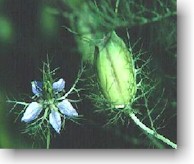The famous Greek physician Dioscorides
used black cumin seeds to treat headaches and toothaches. Mohammed
said that black cumin cures every disease but death itself. The
reason might be found in the complex chemical structure of the
seeds. These little seeds have over one hundred different chemical
constituents, including abundant sources of all the essential fatty
acids. Though it is the oil that is most often used medicinally,
the seeds are a bit spicy and are often used whole in cooking—curries,
pastries, and Mediterranean cheeses.
Nigella sativa seeds have very little
aroma but are carminative, meaning they tend to aid digestion and
relieve gases in the stomach and intestines. They aid peristalsis
and elimination. The essential oil of black cumin is antimicrobial
and helps to rid the intestines of worms.
Black cumin is regarded by many as
a panacea and may therefore not be taken seriously by some, but
for those inclined to dismiss folklore, it should be noted that
these humble seeds have been found superior to almost every other
natural remedy when used for autoimmune disorders, conditions in
which patients suffer greatly because their own systems attack
their bodies. Black cumin, especially when combined with garlic,
is regarded as a harmonizer of the imbalance which allows immune
cells to destroy healthy cells. The technical language to describe
this property is "immunomodulatory action." The difference
between black cumin and interferon is that there are no known side
effects with black cumin when administered in normal dosages. The
saying goes that the beauty of black cumin is their capacity to
restore harmony.
The most dramatic results are
achieved with asthma and allergies. These respond relatively
quickly unless there is infection, in which case, the infection
needs to be eliminated before the symptoms of immune weakness
subside. Continued use for six months or longer tends to give
outstanding results. For extreme fatigue, consider mixing some
crushed seeds with some royal jelly.
 With
a seed containing so many constituents and having such a long
ethnobotanical history, it is not surprising that many throughout
the Mediterranean and Asia believe that black cumin is basically
good for all that ails us. However, the claims are not outrageously
far-fetched if one considers how complete the seeds are in terms
of their many chemical constituents. Still, it is understandable
that anyone who claims that something can do anything from increasing
one's sperm count or increasing milk production in a nursing
mother to relieving bronchial conditions such as asthma and bronchitis,
is not taken seriously. One then wonders if the imagination of
the poets has triumphed over the logic of scientists? Just remember:
those paying homage to the black seeds of the Egyptian oases
were praising the capacity of the seeds to restore normalcy,
not cure. This is not unimaginable if the nutrients are sufficient
to correct deficiency conditions.
With
a seed containing so many constituents and having such a long
ethnobotanical history, it is not surprising that many throughout
the Mediterranean and Asia believe that black cumin is basically
good for all that ails us. However, the claims are not outrageously
far-fetched if one considers how complete the seeds are in terms
of their many chemical constituents. Still, it is understandable
that anyone who claims that something can do anything from increasing
one's sperm count or increasing milk production in a nursing
mother to relieving bronchial conditions such as asthma and bronchitis,
is not taken seriously. One then wonders if the imagination of
the poets has triumphed over the logic of scientists? Just remember:
those paying homage to the black seeds of the Egyptian oases
were praising the capacity of the seeds to restore normalcy,
not cure. This is not unimaginable if the nutrients are sufficient
to correct deficiency conditions.
Protects Healthy Cells
and
Stimulates Production of Natural Interferon
The first major study of Nigella
sativa in cancer prevention and treatment was performed by scientists
at Cancer Immuno-Biology Laboratory of Hilton Head Island, South
Carolina. They concluded that a healthy immune system will detect
and destroy cancer cells before the cancer endangers the patient.
The immune system does this by supporting increased production
of immune cells, bone marrow cells, and B-cells that produce antibodies.
Black cumin stimulates neutrophil activity. These are the short-lived
immune cells that are normally found in bone marrow but mobilized
into action when there is a bacterial infection. Extracts of black
cumin have also been shown to modulate production of interleukins,
a quality it shares with some other highly revered herbs: ginseng,
astragalus, mistletoe,
garlic, and cat's claw.
In animal studies, while none of
the subjects in the control group survived, two-thirds of the mice
that had been given black cumin seed oil were still alive 30 days
after deliberate efforts to cause cancer in the subject groups.
Black cumin is particularly useful in aggressive cancers whose
growth depends on angiogenesis.
In vitro studies performed
in Jordan and the United States have determined that the volatile
oil is anti-leukemic. Studies performed in Spain as well as England
found that the fixed oil is useful in the treatment of rheumatism
and other inflammatory diseases. This property is attributed
to thymoquinone which is as high as 25% in the Egyptian seed
and missing entirely is some seeds.
Culinary Uses
Black cumin seeds are small. They
can be used to make tea by simply pouring hot water over the seeds
and letting the brew steep for 10 minutes, about a tablespoon makes
a nice cup of tea, but it is better to keep the cup covered until
ready to drink so as to prevent the aroma from escaping. Some people
add a few seeds to their favorite tea or coffee and allow their
imaginations to conjure up images of camels and nomads. The seeds
can also be added to casseroles or breads, used in canning, or
extracted in wine or vinegar. Some people grind the seeds and mix
them with honey or sprinkle them on salads. They make a nice addition
to salad dressings and even stir fry dishes, especially when combined
with lemon, cilantro, and tahini.
Black cumin seeds mixed with honey and
garlic are excellent tonics for people with asthma or coughs
as well as those who want to enhance their immunity during
cold and flu season or when an infection is setting in.
Nigella Sativa for Beauty
Most people seeking the benefits
of black cumin take the oil in capsule form. Over a period of time,
usually a few months, the hair and fingernails are strengthened
and have more luster. However, some people use the oil externally,
for beauty as well as for treating skin conditions such as psoriasis
and eczema. One can buy a ready-made cream, add some oil to a favorite
cream, or make one's own cream from scratch by warming equal parts
(by volume) of black cumin seeds and a nice carrier oil, like shea
butter or jojoba. It's best to use a double boiler or be lazy (like
me) and use a yogurt maker because the temperature is very even
so you can safely ignore the process for hours. The oil will darken.
When you feel this has been warmed long enough, melt a little beeswax
into the warm oil. Stir it with a glass rod or new chopstick. If
you like, you can add an essential oil or combination of oils just
before the beeswax stiffens. Choose this for aesthetic or health
reasons. Some people use such mixtures on burns or skin infections;
some just use these creams to feel good, moisturize the skin, relieve
joint or pain, or make wrinkles vanish.
Many combine vinegar and oil. In
this case, mix one cup of black cumin seeds in organic apple cider
vinegar. Let this sit for a few days or two weeks. Then, strain
the mixture, first through a conventional strainer, then through
a finer filter, like cheesecloth or a chemical-free coffee filter
or tea bag. Mix the remainder with equal parts black cumin vinegar
and black cumin oil. Heat this for a few minutes and then put into
a mason jar and refrigerate. Apply this to problem skin such as
areas with acne or take one tablespoon before meals for flatulence
and digestive problems.
More importantly, enjoy another gift
from Nature!





